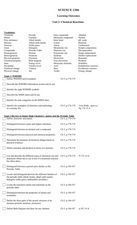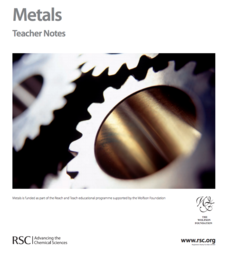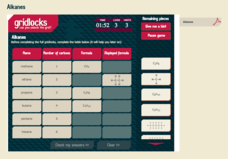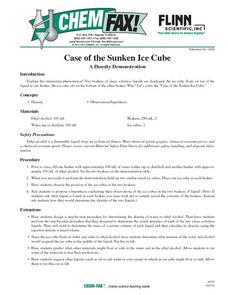Curated OER
Bonding Basics - Ionic Bonds
In this chemistry activity, students complete the chart for each of the listed elements, including the number of protons, electrons, and valence electrons. Then they complete each of the ionic bonds that follows.
Curated OER
Learning Outcomes
In this science worksheet, learners explore the learning outcomes for a unit on chemical reactions. Students define 60 vocabulary words and answer a list of questions for each topic.
Curated OER
More Thermochemistry Problems
This two-page assignment covers basic thermochemistry concepts. Chemistry learners identify exothermic and endothermic processes, explain a phase change graph, and draw an energy level diagram. There are no problems to solve, just...
Curated OER
Matter Overview
There is not much information in this presentation. It serves more as a guide to direct the flow of your introductory chemistry lecture. Each slide displays a large title and a smaller phrase meant to explain it. For example, one title...
Curated OER
Matter and Chemical Bonding
For this chemical bonding worksheet, students read about the invisible killer, dihydrogen monoxide. Students read about the products it is used in and the problems it causes to the environment. Then students complete 19 short answer...
It's About Time
Organic Substances
Host an exciting lab in which learners burn fruit rinds to better understand hydrocarbons. A reading passage and analysis questions wrap up the lesson.
Royal Society of Chemistry
Metals—Gifted and Talented Chemistry
Malleable, magnetic, mesmerizing metals! Pupils love learning about metallic elements, especially through the hands-on activities in an engaging lesson plan. The resource provides thorough instruction on the properties of metals, the...
Virginia Department of Education
Predicting Products and Writing Equations
A chemistry lesson plan presents 14 chemical reactions for scholars to observe, write the equation, and balance the equations. Additionally, it provides ways to extend the activity as it relates to catalysts.
Royal Society of Chemistry
Electronegativity Values
Finally, an electronegativity resource your class will be strangely drawn to! Skilled scientists manipulate interactive puzzles to gain an understanding of common electronegativity values. The great thing? You can conduct the lesson...
Curated OER
Polymers
Students explore online tutorial on polymers. In this chemistry lesson, they create two polymers in the lab and compare their properties. They write a sales letter about their new and improved polymer product.
Curated OER
Candy Reaction
In this triboluminescence worksheet, young scholars use wint-o-green Lifesavers to observe a chemical reaction that gives off light. They break a lifesaver up with a hammer and make observations and they chew a lifesaver and make...
Curated OER
Tie Dye
Students practice writing research proposals to test the color fastness of a dye once it has been exposed to a t-shirt. Each proposal needs details of experimental design, length of treatment, and means of cleaning the shirt. All...
Curated OER
A Little Chemistry
The molecular properties of water are the focus of this chemistry-based assignment. Multiple-choice, true-or-false, matching, and fill-in-the-chart style questions query assignees about the forces that hold the water molecule together,...
Curated OER
Chemical Reactions
In this reactions worksheet, students state the differences between a coefficient and subscript and an exothermic and endothermic reaction. Students review the different types of reactions. This worksheet has 13 short answer questions.
Global Change
The Carbon Cycle and its Role in Climate Change
So how does the carbon cycle work? Kids participate in a hands-on activity that allows them to understand the chemistry behind climate change and global warming. They act out the process of photosynthesis by labeling themselves as...
Royal Society of Chemistry
Alkanes
Alkanes contain only single bonds and have no functional groups. Scholars match the properties of six alkanes in a series of four puzzles. Problem solving and logic help cement the concepts with repetition.
Royal Society of Chemistry
The Blast Furnace
The largest chemical reactors are blast furnaces, used to make iron from ore. Scholars explore reactants by first matching each one to its purpose and formula. Then, a series of three gridlock puzzles reinforce the content while...
Curated OER
Activity #4 What Do Equations Mean?
Students practice with writing and balancing simple chemcial equations. they comprehend that chemical equations are a method of using a set of univeral symbols to represent what happens experimentally in chemical reactions. Pupils...
Curated OER
A Date With Chemistry
Students research certain elements and then analyze their potential bonds with other elements in a dating game where the dating pool is comprised of the elements featured on the Periodic Table.
American Chemical Society
Energy Levels, Electrons, and Ionic Boding
Learners see how electrons are transferred in the bonding of NaCl. They then create models of NaCl using styrofoam balls and toothpicks to assist them in explaining the formation of ions and ionic bonding.
Curated OER
Naming II-More Practice
In this naming chemical compounds worksheet, students are given 10 pairs of elements that bond and students write the formulas and the names of each compound. Students practice writing the formulas for compounds given the names and they...
Curated OER
Unit 4 - Periodic Table
There are 17 multiple choice questions on this periodic table test. The focus is on properties of the elements by group and period. The exam is not formatted well, making it a little difficult to read. There is also a typographical...
Curated OER
Elements of Chemistry: Compounds And Reactions
Learners identify substances and discover common substances and their chemical composition. In this chemistry lesson students write a description of the substances and how they are used.
Curated OER
Chemistry: The Case of the Sunken Ice Cube
Young scholars examine a density demonstration involving ice cubes and beakers of water and alcohol. After observing how one ice cube floats in water and sinks in alcohol, they determine which mixture of the two would suspend the ice...

























